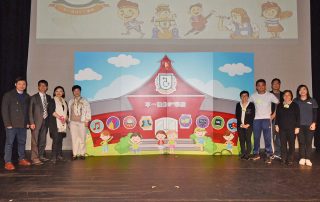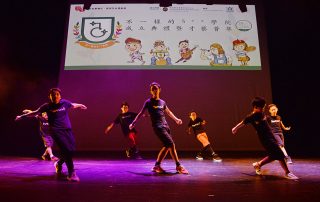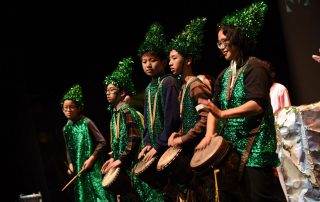As the society places high regard in academic achievements, children with special educational needs (SEN) are often stereotyped as losers because of their unsatisfactory academic performance. Indeed, with proper guidance, these children can also make good use of their talents and excel. Today (28 January), The Salvation Army Hong Kong and Macau Command Social Services Department set up the ‘Alternative 5** School’ that aims to create a loving environment where children with SEN are helped to discover their strengths other than academics. In this way, they may achieve a sense of accomplishment and get a boost of self-esteem. By accumulating successful experiences, they may be motivated to explore new things, fostering a positive and holistic development.
Mr Sin Leung-kai, Subject Leader, Specialized Committee on SEN of The Salvation Army Youth, Family and Community Services said at the ceremony, ‘The School puts a lot of emphasis on caring, encouraging and accepting children with SEN, helping them to discover and realise their own strengths. Also, by getting along with others, it helps boost their self-esteem, to be conscientious and more attentive.’
Mrs Helen Kwok Li Mung-yee, Assistant Director (Youth and Corrections), Social Welfare Department acknowledged the partnership with The Salvation Army. Mrs Kwok says, ‘Every person is unique. Children with SEN have dreams and talents. I believe the School can nurture the children with perseverance to face challenges with courage.’
‘Alternative 5** School’ advocates a ‘strengths-based’ approach, discovering and developing the potentials of children with SEN from eight aspects, including Musical-rhythmic Intelligence, Visual-spatial Intelligence, Bodily-kinesthetic Intelligence, Interpersonal Intelligence, Intrapersonal Intelligence, Naturalistic Intelligence, Verbal-linguistic Intelligence, and Logical-mathematical Intelligence. Moreover, the School also puts an emphasis on the children’s personal development, including Competence and Self-confidence, Family-oriented and Contribution to Society. The School joins hands with different organisations to provide performance opportunities for the children as a channel for the community to understand and recognise the abilities of these children, at the same time parents are encouraged to face their children’s weaknesses and give them opportunities to develop diverse talents.
Last year, The Salvation Army made a comparison between two groups of ADHD children aged 6 to 12. One group of children took part in djembe classes either at school or learning centre, whereas the other group did not. These children were being observed for a period of three months in regard to the changes in their attention, self-esteem and social abilities. The results show that the group of children who learnt djembe scored 2.84 (out of 5) in their self-esteem, with an improvement of 0.32 marks. Their social abilities and attention also improved. As for the other group of children, there is not much improvement or worsening in all aspects. From this we can see by developing their art or diverse talents, children with SEN can also achieve a sense of accomplishment and make improvement in various aspects.
Hip Hop Dancers Overcome Motor Coordination Disorder
‘Moment’ Dancing Team has been set up for four years. Seven members with ADHD have restricted mobility due to motor coordination disorder. The stylish dance moves have drawn these young dancers to hip hop. Through regular training, these little dancers not only break through their physical weaknesses. They also enjoy performing in the public, dancing the easy and rhythmic moves.
ADHD: Scores High in Artistic Creativity
Chung Siu-tung, 11-year-old boy with ADHD, has a passion for drawing. His drawings are always full of wild imagination, but under the mainstream educational system, his creativity only gives him disappointing scores in return. The marking scheme only focuses on skills and aesthetics, killing the concepts and creative ideas of the children and their work are not being appreciated. Today, Siu-tung shared his ideas with the public through drawing, hoping to gain their recognition and respect.





